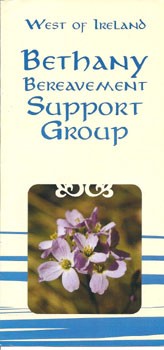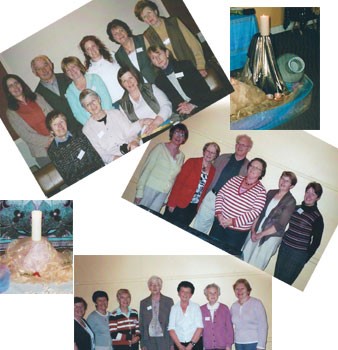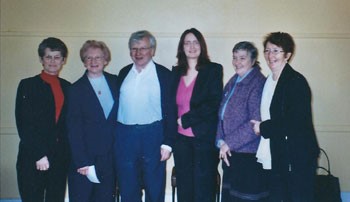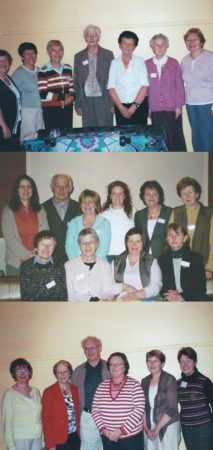Love, speaking in silence, is the way into another’s grief – Basil Hume OSB
What is Bethany Bereavement Support ?
It is a parish based group ministry which aims to help those bereaved and grieving. Support is offered on a one-to-one basis in the home, to groups in drop-in centres, by phone calls, by helping at funeral liturgies and Remembrance services, by providing speakers and other resources. The distinctive features of Bethany are:
(i) the group does not wait to be asked, but initiates contact with the grieving family
(ii) every family is visited irrespective of religion, nationality or cause of death. Usually two months have elapsed before visiting begins, and in the case of death by suicide it is six months, and (iii)the spiritual dimension of grief is recognized.

Why the need for Bereavement Support?
A death, in Ireland, in the past, was a community event accompanied by specific rites and sacred rituals. The entire neighbourhood was involved in providing practical assistance and emotional support to the bereaved. I don’t remember hearing the banshee or keeners, but I can vividly recall rites associated with how the body was laid out, grave digging, wakes, funerals, wearing of black, social engagements etc. In a supportive community the bereaved were given the time and the space to openly mourn their loved one. For many, today, these wise, long established practices have well-nigh disappeared. Nursing Homes, Hospice Centers, Funeral Parlours, in addition to the enormous changes in the fabric of our society have eroded some of the wholesome traditions associated with death and bereavement. Yet, death is a fact of life. All of us experience the death of someone close to us at some time, together with the grieving that follows. Whether death is sudden or expected it is normal to experience feelings of loss, shock, disbelief, anger, guilt, depression. The circumstances of death and the age of the deceased have bearings on the intensity and the ability to deal with bereavement.
Where did Bethany Originate?
It was Dr. Elizabeth Kubler Ross who first documented the stages in the emotional responses to grief and loss. Her research for her book On Death and Dying was done, mainly, in Columbian Presbyterian Medical Centre, New York. It was in that Centre, that Fr. Myles O’Reilly began working as a chaplain in 1975. He was greatly impressed by the care given to the dying there. On his return to Ireland, in 1982, he initiated retreats in Milltown Park, titled Death – A Christian Response. It was from these retreats that Bethany Support Groups were born. The sprawling housing estates and high rise apartment complexes, in the expanding Dublin parishes, offered little neighbourly support to grieving ‘blow ins’. A committed group of lay people under the direction of Fr. John Murphy S.J. decided to address the loneliness and isolation of these grieving people. To establish Bethany in the parishes they designed a training course for prospective volunteers. Over the years, this training course has evolved but the core elements remain, and it is obligatory for all Bethany members. In Spring 1986 five Dublin groups had completed the course and were commissioned in their parishes. A new lay ministry of compassionate listening was initiated, which soon acquired equal status with other lay parish ministries. The name Bethany was chosen because it was here that Jesus offered consolation to the grieving sisters (John 11), and here he was given a listening ear (Luke 10). Today, over 90 parishes in the Dublin diocese have a Bethany Bereavement group, which provides the bereaved with an opportunity to talk in confidence to a trained listener.
 Training Groups
Training Groups
Bethany Comes West
It was not until 2007 that this ministry spread to the West. In a survey done on the needs of the parish of Athenry, support for the bereaved topped the list. A group of 12 offered to get involved if training was available. News had spread about Bethany Support Groups, and Fr. Tony King PP accompanied by Fr. Johnny Doherty CSSR (Esker) investigated the Dublin model. The National Executive said that their trainers were not in a position to travel to the West. They suggested that someone from the West travel to Dublin to receive the training necessary to become a Co-Ordinator/Trainer. At this time I had ‘retired’. Therefore, I was asked by Frs. Tony and Johnny to undertake the training and initiate Bethany Bereavement Support in the West of Ireland.
A Daunting Task
My training took place in Monkstown, Co Dublin every Thursday night for 11 weeks and on one full day, from September to December 2007. Little by little the enormity of the task I had undertaken dawned on me. Bethany has a very professional approach to selection, training and formation of members. By becoming a subgroup we agreed to uphold their standards and abide by their guidelines. I had serious questions about translating a city model into rural areas. Esker Retreat House seemed the obvious venue for training, but how would people feel about a twelve week course there? Where would I find people with the expertise to deliver aspects of the course outside my areas of specialization? At my age, had I enough energy for promotion and recruitment? I shared my concerns with Frs. Tony and Johnny, and we agreed to form a West of Ireland Core Group of volunteers interested in promoting Bethany. Within a few weeks, we had a Clinical Psychologist, a Palliative Care Nurse, a Psychotherapist, a Third Level Chaplain with graduate qualifications in bereavement, and a Pastoral Care Worker dealing with families affected by suicide on board. The enthusiasm and generosity of this group convinced me that the hand of God was in this venture, and all would be well. I was chosen as Chairperson and we elected a Secretary and Treasurer. This was in late November 2007; I was still in training.
 Core Group with Sr. Mary Glennon (Right)
Core Group with Sr. Mary Glennon (Right)
Training Programmes
We set about organizing training for Spring 2008. We decided to conduct the training over two intensive residential weekends in Esker Retreat House. This was a major innovation, but the General Executive Council agreed, once they were satisfied that all aspects of the course could be covered. The essential modules of the course are skills of listening and empathy, self awareness, stages of grief, the grieving process, grief related to the death of a child and death by suicide, coping with loss and change, group facilitation, forgiveness, funeral liturgies, the structures of a Parish group, finance. Talks from people who have coped with significant bereavement are also a feature. Trainees do book reviews and submit self-evaluation forms. The final day is a mini Retreat. Through prayer, reflection, sharing, rituals, symbols and song trainees are invited to face their own bereavement issues particularly any unresolved grief. Ongoing training is offered on needs which arise e.g. preparing funeral liturgies, referral policy etc.
Recruitment
Bethany was, and still is, new to many parishes in the West. We began by designing a colourful brochure which we distributed widely. Using local media, phone, email, snail mail and personal visits we made contacts with parish priests and pastoral councils. It is recommended that parish teams have a minimum of 6 persons. Prospective trainees are interviewed on receipt of their application forms. By March we had our first group assembled. Fr. Tony enlisted 8 of the original 12 from Athenry; Fr. Johnny recruited two people from Carndonagh, Co Donegal; I succeeded in getting teams from Tuam and Clarinbridge, two women from Derry and one from Claremorris came as a result of our brochures, and the Core Group members opted to do the training. On April 20th, 2008, when the General Executive Council came from Dublin, and presented 25 people with their certificates Bethany was fully launched in the West. Since that day we have gone from strength to strength.
 Bethany Groups: Top – Ballinasloe, Middle – Athenry, Bottom – Borrisokane
Bethany Groups: Top – Ballinasloe, Middle – Athenry, Bottom – Borrisokane
The West’s Awake
To date, 9 more parishes have gone through the whole process; training, commissioning, promoting and establishing themselves into active Bethany groups. Each of the 12 groups is developing at its own pace, and offering its unique programme of support. All groups:
- Offer support – not counseling to the bereaved
- Provide the bereaved the opportunity to talk in confidence with a trained listener
- Help the bereaved come to terms with death
- Help the bereaved to learn to live without the deceased; move on with their lives
- Offer help with the Liturgy at the time of death
- Help organise the Service of Light in November
All groups have begun visiting homes of the bereaved, and are greatly encouraged by the welcome they have received and the depth of the interaction. Some groups are actively involved in conducting funeral liturgies. In other parishes drop-in centres have been set up, and although these are slow to take off, people are beginning to avail of this service. Individuals are being referred by doctors, teachers, priests and social workers to the Bethany. We, in the Core Group and the General Executive Council help new groups with teething pains.
Finance
The cost of training is borne by the parish. All established groups can obtain a small grant for their work from the Department of Family and Social Affairs. We, in the Core Group, were, and are, fortunate that we receive grants from Galway Rural Development, ESB Electric Aid, the HSE, and the Department of Family and Social Affairs. These grants cover Core Group expenses: accommodation, travel, secretarial, promotion, speakers, resources etc. The decision of these organizations to grant aid Bethany indicates their recognition of the need for bereavement support in Irish society today.
Conclusion
It seems to me, that God has blessed every step of Bethany’s journey into the West. I see this mininstry of consolation as very much in keeping with our Mercy Charism, our Chapter statement and our Gospel Call. I am greatly heartened by the generosity, commitment and enormous goodness of both the Core Group and those we have trained. I see real hope for our Church because lay people are being given a more active role in their parishes especially in liturgy. It is a privilege and a joy to be part of a movement which enables people to enter the sacred space of compassionate listening. This is holy ground, and as Macrina Weidekeher writes :
Blessed are you if you can offer to others a heart that feels their sorrow;
a heart that can wait quietly beside them;
a heart that doesn’t try to hurry the healing;
a heart big enough to embrace the mystery of another’s grief.
Seasons of the Heart – page 98
Mary Glennon rsm
Western Province


